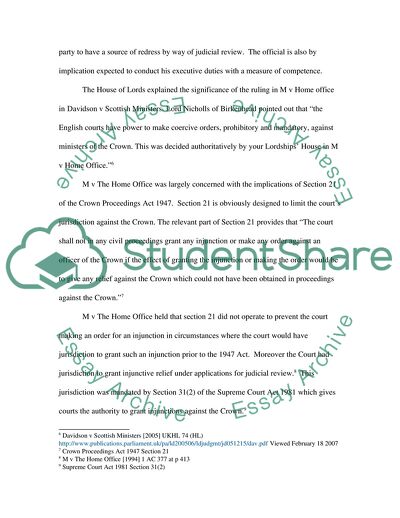
- Home
- Free Samples
- Premium Essays
- Editing Services
- Extra Tools
- Essay Writing Help
- About Us
- Studentshare
- Subjects
- Miscellaneous
- Public Law 1 (A)
Public Law 1 (A) - Essay Example

- Subject: Miscellaneous
- Type: Essay
- Level: Undergraduate
- Pages: 4 (1000 words)
- Downloads: 0
- Author: ngerlach
Extract of sample "Public Law 1 (A)"
eedings against a minister in his official capacity would, if upheld, establish the proposition that the executive obey the law as a matter of grace and not as a matter of necessity, a proposition which would reverse the result of the Civil War.”3 Lord Woolf added that granting an order for contempt against a government official illustrated that the government had suffered the consequences of impeding justice.4 The fundamental principle of the ruling in M v Home Office can be described as a common acknowledgement that no person or entity, even an officer of the Crown in the execution of official duties is above the law.
5 The rule of law seeks to ensure a common confidence in the concept that those acting in official capacities must conduct themselves in accordance with legal integrity, honesty and reasonableness. Implicit in the criteria is the necessity for the aggrieved party to have a source of redress by way of judicial review. The official is also by implication expected to conduct his executive duties with a measure of competence. The House of Lords explained the significance of the ruling in M v Home office in Davidson v Scottish Ministers.
Lord Nicholls of Birkenhead pointed out that “the English courts have power to make coercive orders, prohibitory and mandatory, against ministers of the Crown. This was decided authoritatively by your Lordships’ House in M v Home Office.”6 M v The Home Office was largely concerned with the implications of Section 21 of the Crown Proceedings Act 1947. Section 21 is obviously designed to limit the court’s jurisdiction against the Crown. The relevant part of Section 21 provides that “The court shall not in any civil proceedings grant any injunction or make any order against an officer of the Crown if the effect of granting the injunction or making the order would be to give any relief against the Crown which could not have been obtained in proceedings against the Crown.
”7 M v The Home Office held that
...Download file to see next pages Read More
- TERMS & CONDITIONS
- PRIVACY POLICY
- COOKIES POLICY